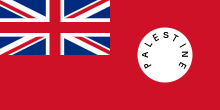1938 in Mandatory Palestine
| 1938 in the British Mandate of Palestine |
|
«««
1937
1936
1935 |
|
»»»
1939
1940
1941 |
|
|
Events in the year 1938 in the British Mandate of Palestine.
Incumbents
Events
- 4 January - The British government appoints the Woodhead Commission to explore the practicalities of the partition of Palestine.
- 10 January - James Leslie Starkey, a noted British archaeologist of the ancient Near East and Palestine who leads the first excavations in Tel Lachish, is killed by a gang of armed Arabs near Bayt Jibrin on a track leading from Bayt Jibrin to Hebron.
- 23 February - The Port of Tel Aviv officially opens, as a competing (Jewish) port to the port in Jaffa, the latter having been crippled by the Arab revolt and general strike since 1936.
- 1 March – Sir Harold MacMichael assumes office as the High Commissioner of Palestine.
- 21 March - The founding of the kibbutz Hanita
- 13 April - The founding of the moshav Shavei Tzion as part of the tower and stockade settlement scheme.
- 26 June - The founding of the kibbutz Alonim
- 29 June - Shlomo Ben Yussef executed for ambushing an Arab bus near Safad.[1]
- 6 July - 18 Arabs and 5 Jews were killed by two simultaneous bombs in the Arab melon market in Haifa, 79 people were wounded.[2]
- 16 July - 10 Arabs were killed and 29 wounded by a bomb at a marketplace in Jerusalem.[2]
- 17 July - The founding of the kibbutz Ma'ale HaHamisha
- 25 July - The founding of the kibbutz Tel Yitzhak
- 25 July - 39 Arabs were killed and over 60 wounded by a second bomb in the Haifa vegetable market.[2]
- 17 August - The founding of the moshav Beit Yehoshua
- 25 August - The founding of the kibbutz Ein HaMifratz
- 26 August - 24 Arabs were killed and 39 wounded by a bomb in the Jaffa vegetable market.[3]
- 30 August - The founding of the kibbutz Ma'ayan Tzvi
- 2 October - 1936–1939 Arab revolt in Palestine: In the 1938 Tiberias massacre, Arab rioters kill 19 Jews in the city of Tiberias, eleven of whom are children.[4] During the massacre, 70 armed Arabs set fire to Jewish homes and the local synagogue.
- 12 October - The British Government announces sending a further four battallions to Palestine.[5]
- 18 October - British army troops regain control of the old city of Jerusalem, which is occupied by Arab extremists in early October.
- 9 November - A technical British committee, known as the Woodhead Commission, reported that "it was impossible, whatever boundaries we might recommend, to set up an Arab State which should be self-supporting".[6] It proposed "a modification of partition which, ...seems, subject to certain reservations, to form a satisfactory basis of settlement", if the U.K is prepared to provide a "sufficient assistance to enable the Arab State to balance its budget".[6]
- 16 November - The founding of the moshav Sharona
- 17 November - The founding of the moshav Geulim
- 24 November - The founding of the kibbutz Eilon
- 25 November - The founding of the kibbutz Neve Eitan
- 25 November - The founding of the kibbutz Kfar Ruppin
- 29 November - The founding of the kibbutz Kfar Masaryk
- 22 December - The founding of the kibbutz Mesilot
Unknown dates
- The founding of the moshav Sde Warburg
- The founding of the moshav Ramat Hadar
Notable births
- 14 July - Moshe Safdie, Israeli-American architect and urban designer
- 29 October - Ralph Bakshi, Israeli-American director of animated and live-action films
- Full date unknown
- Salman Abu-Sitta, Palestinian Arab researcher
- Naji al-Ali, Palestinian Arab cartoonist (died 1987)
- Ahmed Jibril, Palestinian Arab, founder and leader of the militant group PFLP-GC
- Abu Ali Mustafa, Palestinian Arab, member of the PLO executive (died 2001)
References
- ↑ Marlowe, John (1946) Rebellion in Palestine. The Cresset Press, London. pp. 198,199.
- ↑ 2.0 2.1 2.2 Marlowe. p.200
- ↑ Marlowe. p.201
- ↑ League of Nations Archives
- ↑ Marlowe. p.203
- ↑ 6.0 6.1 "Woodhead commission report".
(p. 236) FINANCE...we found that it was impossible, whatever boundaries we might recommend, to set up an Arab State which should be self-supporting.... deficits of £P.610,000 per annum for the Arab State (including Trans- Jordan) and of £P.460,000 per annum for the Mandated Territories, but a surplus of £P.600,Q00 per annum for the (p. 237 ) Jewish State. We have found that it is not possible to call upon the Jewish State for a direct subvention to the Arab State, and neither practicable nor equitable to set up an Arab State with a budget so very far from being balanced. We conclude that, if partition is to be carried out, there is no alternative but that Parliament should be asked to provide, in some form, sufficient assistance to enable the Arab State to balance its budget. (p. 246)...CONCLUSION ... The question whether partition is practicable involves considerations of two kinds : practical and political. The former concern chiefly finance and economics ;.... But the financial and economic difficulties, ..., are of such a nature that we can find no possible way to overcome them within our terms of reference. ... we have proposed, ... a modification of partition which, ... seems to us, subject to certain reservations, to form a satisfactory basis of settlement, if His Majesty's Government are prepared to accept the very considerable financial liability involved. There remain the political difficulties. .... But there is still the possibility that both sides may be willing to accept a reasonable compromise.
